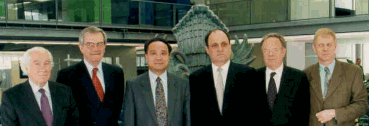Explore other
| Linktoparent |
|---|
MoU on electronic business between IEC, ISO, ITU, and UN/ECE
Each of the four signatories of the eB-MoU (International Electrotechnical Commission, International Telecommunication Union, International Standards Organization and the UNECE) have developed or are developing standards related to electronic businessThe International Telecommunication Union signed on 24 March 2000 a Memorandum of Understanding on electronic business, joining three leading international standards-setting organizations already party to the MoU, namely the International Electrotechnical Commission (IEC), the International Organization for Standardization (ISO), the United Nations Economic Commission for Europe (UN/ECE). In addition to the four signatories, the MoU is open to other international, regional, governmental, industry and consumer organizations whose core mission involves standards-setting, as registered international user groups.
UNECE chaired the IEC-ISO-ITU-UNECE Electronic Business Memorandum of Understanding Management Group in 2021-2022.
The objective of the meeting is to coordinate relevant work programs with the participation of International User Groups to optimize the use of scarce resources for standardization in electronic business. Organizations are invited to bring forward to the Management Group information on new work items or other developments which may provide opportunities for exploiting new technologies. In order to foster cooperation at the working level all expert groups of each organization shall allow authorized, competent experts of the other organizations to participate in their work.CALS 1 International and NATO CALS were the initial user group participants.
"The purpose of the MoU is to minimize the risk of divergent and competitive approaches to standardization, avoid duplication of efforts and avoid confusion amongst users" said Houlin Zhao, Director of ITU Telecommunication Standardization Bureau when signing the agreement on behalf of the ITU "The MoU will also provide greater intersectoral coherence in the field of electronic business, an important step considering the uptake of e-commerce" Zhao added.
Mr. Yves Berthelot, Executive Secretary to UN/ECE, stressed that the participation of ITU is essential to secure the interoperability required by the network economy. He further added, "When countries adopt international standards and harmonize their technical regulations worldwide, everybody stands to gain. Moreover, the development of technical instruments shared by all countries facilitates and strengthens their involvement in harmonious economic relations. This vital role of international standards as the technical foundation for the global market is explicitly recognized by the World Trade Organization".
The MoU establishes a coordination mechanism under a unique cooperative model to produce mutually supportive standards required in business transactions (data interchange and interoperability) as well as products design and manufacturing to meet the urgent needs of both the industry and the end-users. Electronic business covers the information definition and exchange requirements within and between enterprises, including customers. Given that it provides the vital framework for e-commerce, it is intended that this MoU will support this rapidly changing and fast growing business sector.
ISO Secretary-General, Dr. Lawrence D. Eicher, commented: "This MoU is an excellent practical example of greater partnership between the governmental and private sectors. It lays the foundation for a healthy future development of e-commerce to the benefit of all stakeholders."
Under the MoU, the four organizations undertake to review their standardization activities and develop a joint, coordinated programme for standards development and publication which will benefit the marketplace.
The MoU is open to other international, regional, governmental, industry and consumer organizations whose core mission involves standards-setting.
- Annex B: MoU Management Group - Terms of Reference (8 October 2019)










